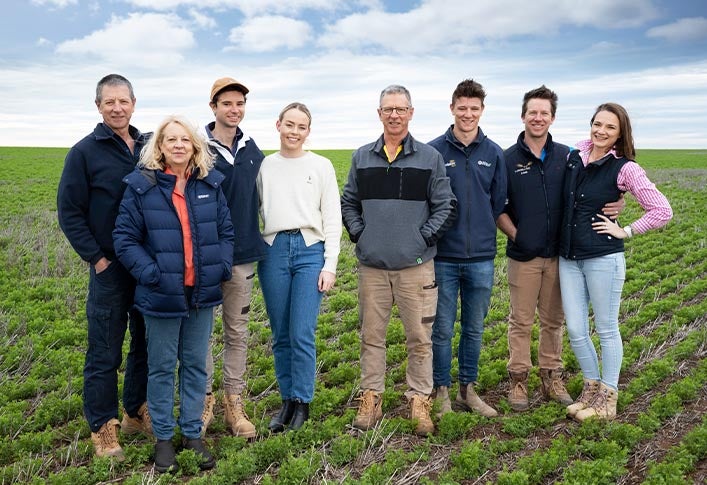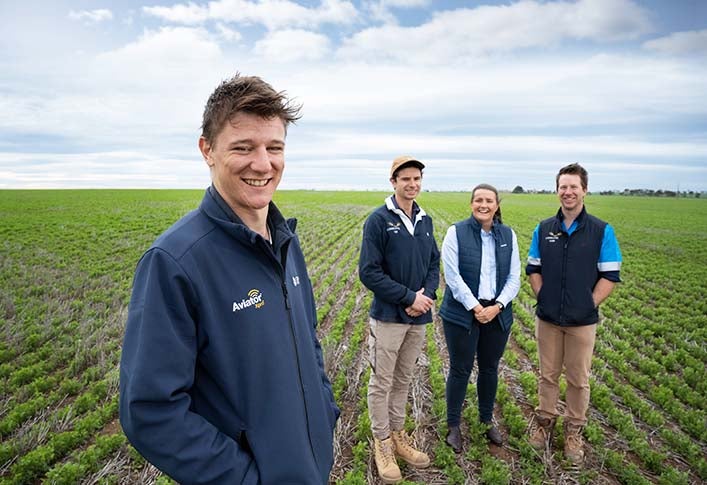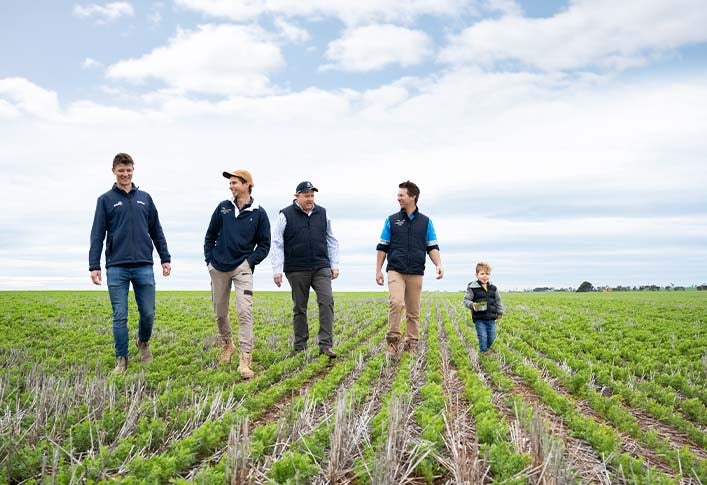Posted by on
18/11/2022
For the majority, inter-generational succession tends to focus on the division of an asset, yet South Australia’s Correll family believes there’s strength in numbers – and scale – when it comes to growing a family business.
Cousins Sam and Tim Correll help run a third-generation enterprise in the Arthurton region, and happily admit they have no ambitions of splitting up the operation, instead favouring the efficiency afforded by running a larger scale property.
The 4000 hectare dryland cropping operation currently consists of 35-year-old Sam, 26-year-old Tim and their fathers, Paul and David, who happen to be identical twins.
Tim also has twin brothers, Matt, an agronomist and Harry, who works in contract earthmoving and plumbing – and Sam believes there’s room for them all in the business, particularly considering their various skills.
“I think we’re in a stronger position to grow the enterprise as a family team, as opposed to carving it up and going our separate ways. We all get on exceptionally well, and have a shared vision for business, and lifestyle – which is important,” Sam said.
The Correll family’s farming legacy was spearheaded by Sam and Tim’s Poppa, Ken, who initially purchased just under 200 hectares in the Kadina region to run sheep and pigs.
And it’s easy to see where his grandsons get their courage to question the status quo.
“Our Poppa identified the potential here in the Arthurton region, and in 1962 purchased 300 hectares with reliable rainfall and a better soil structure – his friends thought he was crazy to make the shift but his decision to sell his original Kadina farms and buy here in Arthurton set us all up.”
During the generations the Correll men have turned their hands to generating a diversified cash flow, and for Paul and David, intensive piggeries was a core contributor to the business during their youth, whilst Sam went shearing in the off seasons in later years.
“Poppa set the pattern of passing on management of the land at a young age. Nanna and Poppa were always very positive to growth and change so Dad and Uncle David had the freedom to realise opportunity and learn from their mistakes,” he explained.
This is when the enterprising brothers identified strength in the pig market, and built pig sheds to direct the business towards pig production.
Paul and David – plus their wives Andrea and Kathy – continued to grow the business in the area, investing in land acquisition in favour of super or investments, with Sam believing that “land has, and always will be, our most effective value add.”
Twenty years ago the brothers started diversifying out of piggeries, identifying better gross margins in wheat and lentils, which remains the Correll’s core focus to this day, along with barley and canola.
Over the years they have consistently purchased land within a 10 to 15 kilometre radius to consolidate their holdings, and drive efficiency.
Embracing opportunity

However, Sam explains that his father and uncle weren’t necessarily tied to the Arthurton region if opportunity knocked, and their ability to think outside the square when acquiring farm land ultimately paid dividends.
“The Yorke Peninsula was a great growth area during their time, but it eventually became tightly held, so at one stage they purchased a property at Wasleys, near Adelaide to continue their growth momentum.”
They also began looking in the Parkes/Forbes region to continue their expansion but when the opportunity to purchase more land locally around Arthurton did finally present, they sold their outer-district farm and consolidated.
“It really taught me not to be scared to branch out in the name of acquiring land. Some purchase off-farm investments, but for us the investment in land has really paid off.”
Growing a modern farming business
Sam, a highly considered young farmer, is under no illusion that his generation will see the same land acquisition gains and physical growth the two previous generations enjoyed during their tenure.
Considering current land prices, business growth, he believes, will come from working smarter through the adoption of technology and innovation to increase production per hectare.
“We need to grow as much grain as we can to produce yield – we can’t control the price but we can manage our crops for maximum productivity.”
For the past two decades the Corrells’ have applied liquid trace elements during seeding, which Sam believed “kicks the crop along when germinating and in early stages of growth” and invested in machinery that will ease processes and drive productivity.
Protein monitors on headers and yield mapping help deliver genuine data, and Sam said they’ll continue to chase that one per cent to improve productivity.
“We’re not afraid to push our Nitrogen. Sometimes it doesn’t work, but we optimistically farm for a good year, every year, and we’re fortunate that in this region we have fairly reliable rainfall which makes consistent year-to-year decision-making a bit easier.”
Despite the high price of inputs, Sam said they stuck to their guns this season – and the gamble paid off, with yields and grain prices both favourable.
Sam has also identified an opportunity to value-add through improving paddocks that are underperforming, as well as the continual improvement of their better areas through nutrients such as gypsum and lime.
A focus on continual improvement

Sam and Tim both prioritise personal and career development, with Sam a graduate of Rabobank’s Farm Management Program (FMP), intended to grow business skills, strengthen networks and improve strategic management ability.
It’s an opportunity he recommends to any young farmer.
“I really believe you need to keep challenging yourself to progress a business, if you pause you lose momentum, and become stale.”
“After the FMP I came home so motivated, I thought I could conquer the world and it’s such a great feeling!”
Having completed the course when he was just 21, Sam admits the business side of the farm initially left him feeling overwhelmed.
“The FMP gave me a much deeper understanding of the financials, and now dad and I do the bookwork together and it’s a great skill to have.”
Sam and Tim also attended Rabobank’s domestic grains tour in 2019, which he said was a really valuable week with inspiring guest speakers, and a unique opportunity to see first-hand how other farmers manage their businesses.
“Everything that Rabobank puts on is always professionally run, generous and I always feel very well-looked after.”
“Rabobank’s various courses, events and tours contribute enormously to my own personal knowledge and networks and I enjoy every one of them – I’m always impressed by Rabo’s morals as a bank and as a business.”
Growing together

As long-term Rabobank clients, Sam said his rural manager Ben Allen was also an integral member of their business.
“Our relationship with Rabobank goes well beyond that of a farmer and a banker, Ben is genuinely interested in what’s going on around the farm.”
“He’s always available when we need him and calls in often – in fact it’s not uncommon for him to take a ride in the header during harvest to see what’s going on,” Sam smiles.
“What I enjoy most about our relationship though is that he’s always probing us and provoking thought – he’ll urge us to reflect on our thoughts for the future or what our interests and priorities are – things that we don’t often have time to consider when we’re busy working.”
Sam said Ben had also never doubted their business strategy, supporting their growth aspirations through the purchase of machinery and property.
And with Sam and wife Jessamy now with two young children of their own, Celeste, five and Fletcher, four and Tim engaged to Andrea, Sam said it was reassuring to be partnering with a rurally-focussed bank, that understood their family and their business and their goals for the next generation.
“We still need to be able to sleep at night, but when opportunity approaches it needs to be seriously considered, and it’s reassuring we have Rabobank supporting us with these major decisions every step of the way.”
